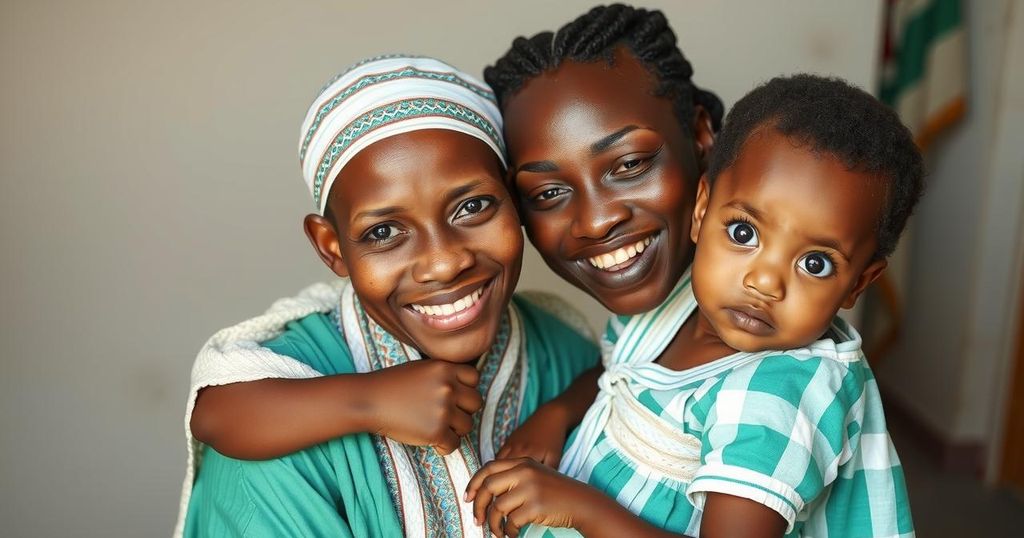Enhancing Maternal and Child Health in Nigeria: Collaborative Efforts and Ongoing Challenges
Hajiya A’ishatu’s experiences at a primary health care facility illustrate Nigeria’s efforts to combat high maternal and child mortality rates, supported by funding and initiatives from the government and international partners. Despite significant advancements, challenges such as underfunding, staff shortages, and economic factors continue to impede progress in health care access for women and children. The introduction of new health initiatives aims to foster collaboration and investment, promising a path toward improved health outcomes.
Hajiya A’ishatu, a shop owner from the outskirts of Tudun-Wada in Nigeria’s Gombe State, reflects on her positive experiences at the local Primary Health Care Facility where she delivered her children. “I had all my children in this facility,” she expresses. The facility’s medical staff provided essential support, ensuring her children’s healthy growth. A’ishatu’s story highlights Nigeria’s national campaign to enhance maternal and child health services, especially in underserved areas.
Nigeria grapples with alarming levels of maternal and child mortality, constituting 20% of the global burden. The establishment of the Basic Health Care Provision Fund has enabled the government to allocate crucial resources toward enhancing primary health care. Supported by the Global Financing Facility for Women, Children and Adolescents, pilot programs in three states have expanded nationally, bolstering approximately 900 health care facilities with vital infrastructure, free maternity care, and even transportation for midwives to reach remote communities.
Additionally, collaborative efforts with the World Bank through the Nigeria State Health Investment Project have targeted health improvement in Northeastern Nigeria, a region beset by conflict. This initiative has significantly increased safe deliveries, improving from 22% to 68% between 2014 and 2020, and has tripled annual child immunizations to reach 1 million.
Youth health is also prioritized through the Accelerating Nutrition Results project, which provides adolescents with better family planning resources, resulting in increased contraceptive use. The initiative has extended its reach to 12 states, offering nutritional services to nearly 5 million pregnant women and over 7 million children under five, while tackling severe malnutrition affecting an estimated 2.6 million children nationwide.
Young women like 17-year-old Maryam Ishah express gratitude for the life-changing services they now have access to. “I learned a lot from the counselors at the health center and now I am able to share this information with my community,” she states, indicating the significant impact these resources have on personal and community health.
Despite these advancements, numerous challenges persist, chiefly underfunding for women’s and children’s health. Many women, particularly in areas lacking sufficient healthcare facilities, continue to face preventable mortality. Zainab Umar Ciroma, Facility in Charge at Tudun Wada, highlights severe staff shortages and long wait times, worsening under economic decline. Many women have reverted to traditional healers and home births to avoid costs, as observed by patient Sumaiya Yakubu: “Now so many women prefer to give birth at home because at least they don’t have to pay for anything.”
To address these systemic issues, the Nigerian government is implementing the Nigeria Health Sector Renewal Investment Initiative, which aims to reduce maternal and child mortality rates significantly. This approach fosters collaboration among various partners, emphasizing alignment around national health priorities. The World Bank’s recent approval of a $570 million primary health care project exemplifies this partnership, incorporating significant contributions from several international financing bodies to alleviate gaps in primary health services.
As Nigeria progresses in enhancing health care access for women and children, the government’s commitment to collaborative initiatives presents a hopeful trajectory. With sustained investment and strategic partnerships, there lies potential for transformative changes in the health sector, ultimately safeguarding the rights to health for women, children, and adolescents across the nation.
Nigeria faces one of the highest rates of maternal and child mortality globally, with significant challenges in health service access. In response, the government launched strategic initiatives aimed at improving health care delivery, particularly in underserved areas, by leveraging partnerships with international organizations. These efforts focus on expanding facilities, enhancing maternal health care, and addressing the nutritional needs of children and adolescents, all of which are crucial to reversing negative health trends prevalent in the country.
In conclusion, while Nigeria has made commendable strides in improving maternal and child health, challenges remain that require ongoing attention and funding. The government’s dedication to revitalizing health care through innovative initiatives and partnerships holds promise for substantial improvements in health outcomes. Continued efforts are essential to ensure all women, children, and adolescents receive the comprehensive health care services they need to thrive.
Original Source: www.worldbank.org




Post Comment